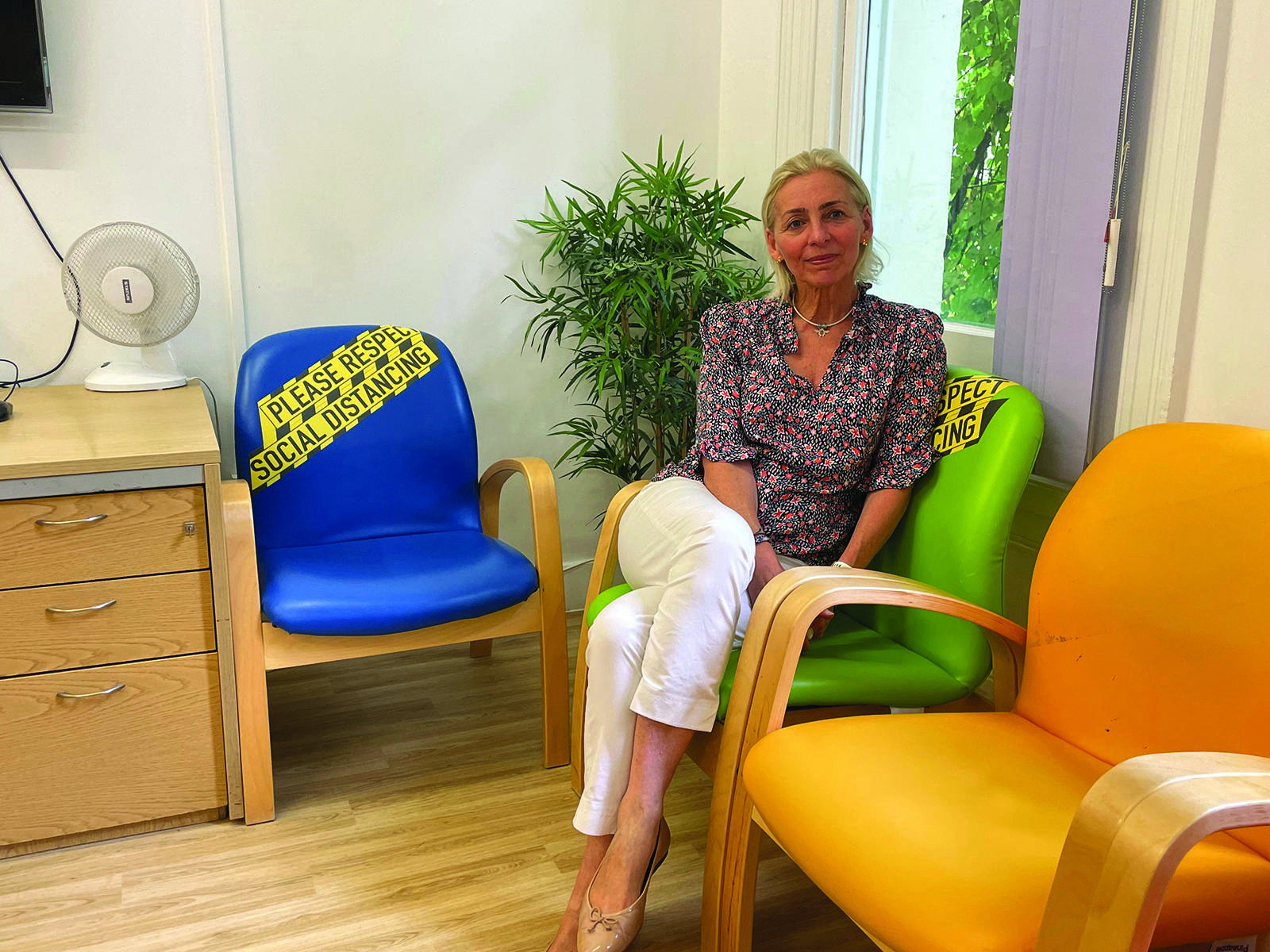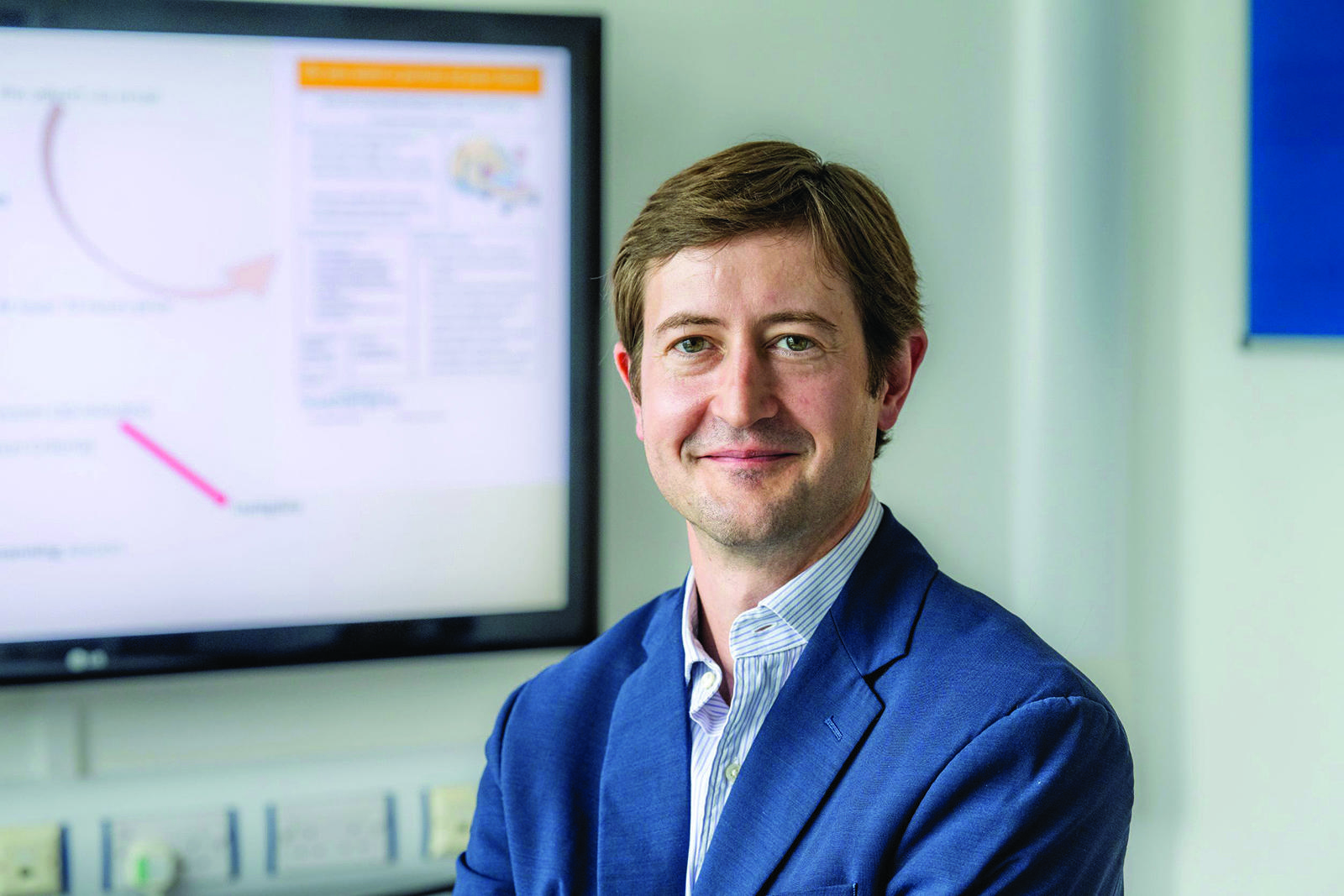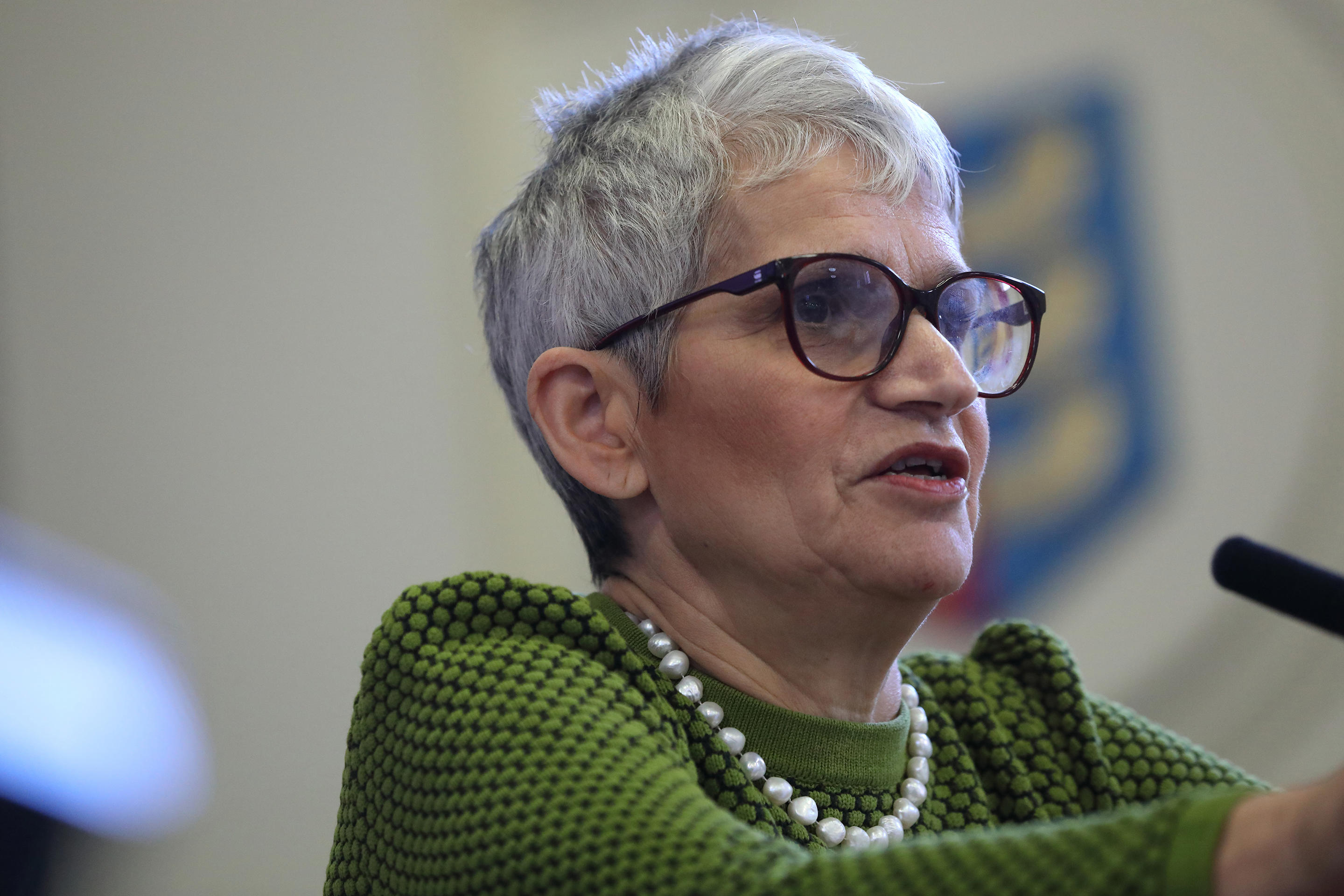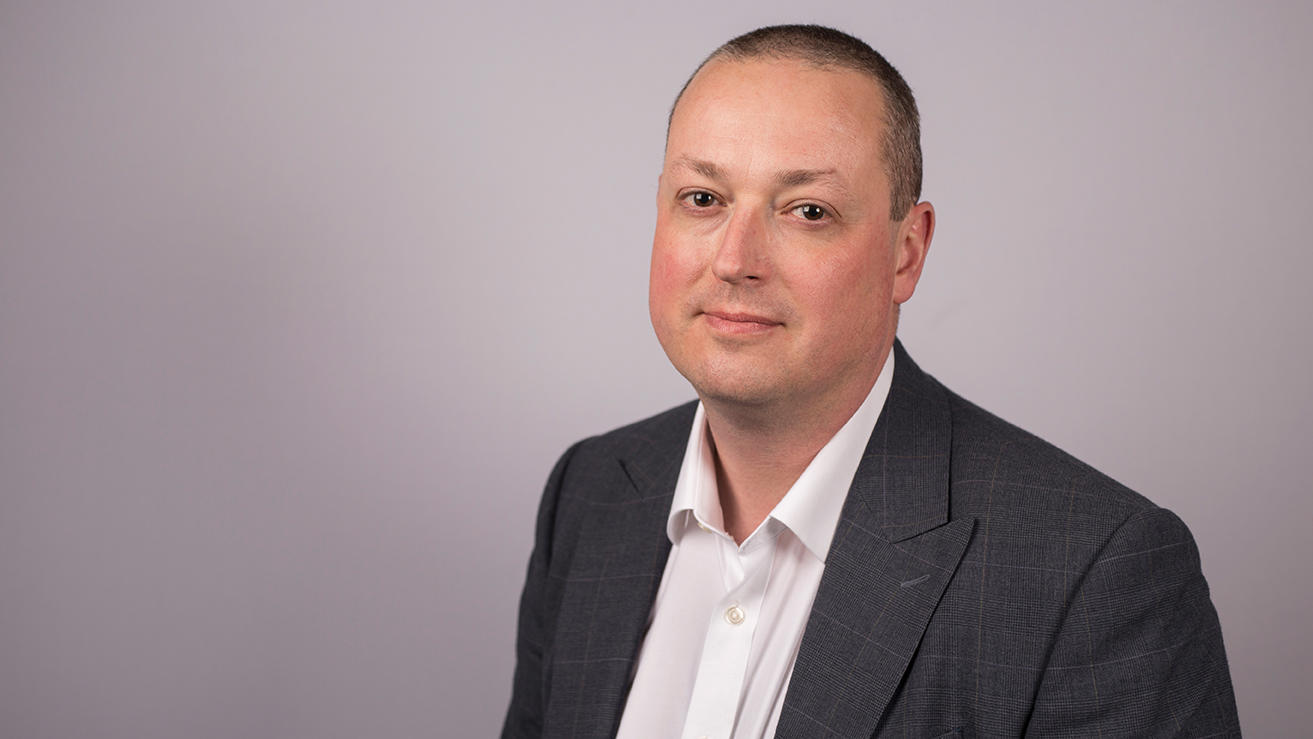‘Gambling addiction is an awful addiction. And it harms so many people along the way,' says Dame Clare Gerada, president of the Royal College of GPs, who set up the Primary Care Gambling Service in 2019.
She adds: ‘As a relatively new kid on the block with gambling, what really surprises me is just how sick these people are.’
There is growing alarm in the medical profession about gambling. This year’s BMA annual representative meeting agreed to recognise the ‘large burden of morbidity and possibly mortality caused by harmful gambling’ and that regulation is ‘inadequate’.
Unlike dependencies on drugs and alcohol, gambling – for Dame Clare – is often ‘a secret addiction’.
‘For the vast majority of people, using scratch cards or playing the lottery, gambling isn’t a problem,’ she says.
‘But where it is a problem, it’s catastrophic. If I bet, I don’t have a compulsion to bet again to make up my losses. I walk away. Gamblers think if they’ve lost five times they must win the sixth, when their chances are the same. They don’t realise the basic statistics. They get into this abnormal thinking process, a bit like people with alcohol use disorder – who never think they’ve got a problem.
‘It’s comparable to alcohol dependency, but worse. A six-year-old isn’t allowed to buy alcohol, ever. If they’re tall enough, they can put money into a slot machine at a fair and pull the one-eyed bandit.
‘Someone with alcohol dependency becomes fairly obvious, but a gambler tucked away in their bedroom is well-hidden. It’s such a hidden problem – but treatment works.’
Problem gambling is often identified late. Andrew Molodynski, a consultant psychiatrist in Oxford and national mental health lead for the BMA consultants committee, says: ‘People tend to present for services because they’re having a crisis and it suddenly becomes apparent. They try and manage it for years, using credit cards or loans and all of a sudden it all falls apart.’
People tend to present for services because they’re having a crisis and it suddenly becomes apparentDr Molodynski
It affects families too. ‘I saw a woman who presented because she was depressed because her husband had a £60,000 gambling debt, which was causing difficulties,’ he adds.
Stigma, and a lack of understanding, remain barriers to treatment.
Henrietta Bowden-Jones, who set up the first NHS clinic for gambling disorders in 2008 and is now national clinical adviser for gambling harms, has been advising NHS England on the rollout of the specialist clinics as part of the NHS Long Term Plan.
She says: ‘Only 5% of people who need treatment are coming forward seeking help. It could be that people don’t know treatment exists, don’t feel ready, don’t want to give up their addiction or feel ashamed. A lot of work needs to go into that.’
As director of the National Centre for Behavioural Addictions UK, which includes the National Problem Gambling Clinic, Professor Bowden-Jones sits as the expert psychiatrist with a group of experts reshaping the National Institute for Health and Care Excellence guidelines for treating gambling-related harm and is the co-author of a recently published textbook on how to treat gambling disorders.
 BOWDEN-JONES: Greater access to services needed
BOWDEN-JONES: Greater access to services needed
Following decades of research and fine-tuning methodology, the service is expanding as part of the 2019 NHS Long Term Plan. New clinics have opened in Southampton and Stoke-on-Trent in addition to London, Leeds, Manchester, Sunderland and a national children and young person’s pilot clinic. It is hoped these will offer nationwide coverage, but there are varying statistics on the number of patients who need treatment.
Between April and December 2021, 668 people with the most severe gambling issues were referred to NHS gambling clinics – up 16.2% from 575 during the same period in 2020.
A 2020 YouGov prevalence study estimated up to 2.7% of adults in Great Britain, or nearly 1.4 million people, were problem gamblers – but the Government’s Gambling Commission survey put the rate at 0.2%. The latest Public Health England report on gambling suggests 0.5% of the population (about 246,000) are problem gamblers, and 3.8% (2.2 million) are ‘at-risk’ gamblers.
Professor Bowden-Jones believes immediate work is needed for higher numbers of people suffering from gambling disorder to access treatment: she hopes the service can treat 10% ‘as quickly as possible’.
Reliance on charities
That would require trebling the 10,000 to 12,000 treatment episodes taking place each year across the NHS and charitable sector. GambleAware says 90% of treatment is accessed outside the NHS.
Dr Molodynski wants an NHS gambling clinic in every integrated care board area. He says: ‘The charities do great work but passing it on feels like it downgrades the seriousness of the problem. Charities are usually run by people who have had gambling disorder themselves. They are very important, but we shouldn’t rely on them. We need sufficient core services.’
Professor Bowden-Jones agrees charities have ‘an enormous amount of people who really care about gamblers and who are really committed’. But she stresses the importance of the evidence-based approach of NHS treatment she has designed including via ‘a national helpline that works’.
‘At the moment, it hands people to the non-state sector. There will be a lot of risk there, we need to make sure people get sent to the NHS when they are severe enough.’ The NHS treatment Professor Bowden-Jones has built is ‘all to do with limiting access to gambling opportunities and shaping behaviour’ using core principles of CBT (cognitive behavioural therapy).
Patients are given a full psychiatric assessment for comorbidities, other addictions and an overall health check and an early stimulus control programme is created. This includes self-excluding from websites and high street bookmakers, limiting access to gambling-related content on phones and laptops and blocking gambling-related purchases via banks.
Some patients share account details with partners or limit cash withdrawals to £20. One-to-one modules follow if patients have comorbid severe mental illness, or deep trauma – otherwise they go into group CBT.
The charities do great work but passing it on feels like it downgrades the seriousness of the problemDr Molodynski
While Professor Bowden-Jones admits ‘there are always loopholes’, she insists self-regulation works. ‘If you really want to gamble you will find a way,’ she says. ‘But the majority of our patients are stopped from gambling – or it becomes very hard to circumnavigate.
I’ve had people throw their laptops to the floor because they’re so frustrated. If there was an invisible barrier in every pub, and you couldn’t use your card to buy vodka in the shop, you’d have quite a bit of trouble drinking.’
Online treatment has helped increase the number of patients the clinics see. The number of did-not-attends reduced from 20% to 12% since the pandemic forced treatment to go virtual. Professor Bowden-Jones points out: ‘Gamblers have used travel money to gamble. Our patients often have more than one job to pay debts – and they all have debts – and many are under close scrutiny from families who don’t want them to disappear for the day.’
Professor Bowden-Jones says 70 to 75% of people ‘do very well’ in treatment, which means they are not gambling at all. ‘The only way forward with gambling is abstinence,’ she adds. ‘There is no way someone with a gambling disorder can return to a healthy relationship with gambling. They will always relapse.’ She says 20 to 25% return but notes they could be being treated elsewhere, which isn’t yet measured routinely.
Measuring progress
Dame Clare’s primary care service uses a patient-determined outcome measure called Cyclops, developed for mental health. ‘Abstinence is an important measure of success but it’s such a hard measure and there are others,’ she says, explaining how patients mark progress by reducing gambling, keeping money aside to buy presents for children or managing co-morbidities such as drug or alcohol use.
Though she stresses: ‘You can’t just gamble a bit. You either stop gambling or you don’t.’ And because of the frequency of comorbidities, ‘you might get smoking going up if there is an improvement in gambling’.
Sam Chamberlain, professor of psychiatry at the University of Southampton, and consultant psychiatrist at Southern Health NHS Foundation Trust, is service director for the new Southern Gambling Clinic.
He has led on clinical trials for new gambling disorder treatments, authored clinical books, published research about gambling and related disorders and leads a specialised NHS clinical service for other behavioural addictions and obsessive-compulsive related disorders. He says: ‘I’ve been waiting my whole career for appropriate funding to be made available for gambling treatment in the NHS. We thought it would never happen.’
 CHAMBERLAIN: Research vital to understanding gambling disorders
CHAMBERLAIN: Research vital to understanding gambling disorders
His service also uses CBT, but he says the use of evidence-based medications ‘can make a real difference’ with certain patients and this is ‘tailored to the individual’.
‘Some people might not respond to a particular treatment, or they might not be available in that area, or they might have a strong preference for a different type of treatment,’ he says, noting different clinics try different evidence-based approaches and share results with each other.
‘There’s a lot we still don’t understand about gambling disorder, especially in the UK,’ says Professor Chamberlain, who explains the importance of continued research alongside treatment.
‘We have evidence-based treatments but we need larger clinical trials for CBT and medications in order to firm up treatment guidelines. There are exciting opportunities to develop new treatments and early interventions based on comprehensive biopsychosocial understanding of the condition, informed by the latest findings from the neurosciences and psychology.’
I’ve been waiting my whole career for appropriate funding to be made available for gambling treatment in the NHSDr Chamberlain
He works proactively with charities assisting people with debt, and homelessness shelters. ‘But that’s different to working with charities directly funded by the gambling industry,’ he explains, but adds: ‘That doesn’t mean I don’t think there’s a role for other services as well. People should have choices.’
Professor Chamberlain says: ‘Gambling disorder has probably existed since mankind began. We have records of people gambling excessively in ancient texts. But it was only relatively recently, in the 1980s, when it first became more widely recognised as a mental health condition. There’s always been a need for treatment but there’s been an under-recognition and a lack of drive to develop clinical services.
‘What we’re seeing now, with the internet and apps, is people increasingly not only physically gambling in a casino or the bookies, but on their phones, which they have 24/7. And it can be highly addictive.’
Professor Chamberlain explains how gambling disorder leads to other negative consequences, such as homelessness, anxiety, depression, substance misuse and criminality.
‘If we give evidence-based treatments to reduce gambling disorder, we can reduce those wider harms as well.’
Dame Clare says of the 150 to 180 patients who have been treated at the Primary Care Gambling Service, ‘only about five haven’t had co-morbidity’ reporting schizophrenia, bipolar, alcohol and drug dependency and homelessness being linked. ‘It shows the system is preying on the vulnerable,’ she says. ‘Gambling is one part of a complex system of problems that’s either caused by gambling or the gambling is coincidental. We need to start to unpick this.’
‘Make it easy’
She believes the NHS needs to make it ‘as easy as possible’ for those with gambling disorders to seek help and wants to raise more awareness of early signs of addiction, such as chasing losses, feeling guilty, secrecy and people spending more time or money than they can afford on gambling.
Dame Clare used her experience of working in a shared care service treating people with drug addictions to plan the intermediate, multi-disciplinary, GP-led service she runs for gambling now. ‘We sit between the third sector and the specialist sector,’ she says as she explains the service is there to take the weight off GPs who ‘are worked enough’.
 GERADA: ‘There should be much more responsibility on the gambling industry’
GERADA: ‘There should be much more responsibility on the gambling industry’
The service asks only for minimal details from GPs, accepts self-referrals and treats patients who want to remain anonymous. ‘The role of the GP is to identify and refer and try and support affected others. It’s too much to ask a GP to manage this complexity.’
Dame Clare says gambling is hard to spot because it’s ‘in the background’ – but urges GPs to add gambling questions to basic screening. ‘If you ask about smoking and alcohol, ask about gambling too,’ she says.
‘Ask simple questions, like “have you ever felt guilty about the amount of money or time you’ve spent on betting?” Ask about it in depression, domestic violence and debt. If somebody has attempted suicide, especially as a man, ask about gambling.’
One aspect of the ARM motion is to allow coroners to cite gambling as a factor in suicides. Dame Clare agrees. ‘If you’re a smoker, and you die of a smoking-related disease, a coroner can put that down. There are serious amounts of completed suicide in which gambling is a cause, yet we don’t put gambling down. Until we do, it will remain hidden.’
Dr Molodynski believes coroners would be supportive of the change. ‘If they record when suicide is a factor, it can be measured and monitored to help show the scale of the problem as well as put pressure on the gambling companies to do more.’
Stronger regulation needed
And putting pressure on gambling companies to do, and contribute, more is high on the agenda for Professor Bowden-Jones. She has been calling for a levy of 1% of GGY (gross gambling yield), essentially profits, rather than voluntary donations from the sector – which made £14.1bn in 2019/20. This has the backing of the Lords gambling industry committee but has not progressed through the Commons. There are reports it is low on the new prime minister’s list of priorities.
Professor Bowden-Jones argues: ‘You need independent funding to make sure the right questions are being asked and a levy wouldn’t cost the Government anything.
'Research is very expensive, and the bodies funded voluntarily are never going to commission research that is exact. I’ve been calling for a large-scale prevalence survey in this country for 15 years, it’s one of the many issues, such as randomised control trials, that have not been studied enough in this field.’
 MOLODYNSKI: 'We need sufficient core services'
MOLODYNSKI: 'We need sufficient core services'
Until such independent studies happen, policymakers will have ‘no idea’ if the problem is growing, she adds. And she is adamant regulation isn’t strong enough, partly because the ‘nanny state’ argument is very strong at the moment owing to a lack of research.
‘What I’m told all the time by politicians is, “yes, but the country has a right to gamble” because gambling is not illegal in the same way as drinking is not illegal.
‘Whenever we talk about banning advertising you’ll find politicians, or the general public, saying we’re too extreme – and that gambling only harms a small minority. We don’t know what minority because we haven’t invested in a prevalence survey that works.
‘With tobacco, it’s very clear. It’s not an association, it’s causation – it kills you. That’s simple, and it’s still been a hard battle against the tobacco industry. But once that incredible 1960s research was done there was no turning back.’
Make the industry pay
Professor Bowden-Jones says she ‘does not endorse’ what she calls ‘industry-friendly taglines made up by industry-friendly charities’.
Dr Molodynski puts it more bluntly: ‘Saying “When the fun stops, stop” is the equivalent of saying “when you’ve smoked crack five times a day, stop”.’
He suggests: ‘They could have disclaimers, like on cigarette packaging, giving the stats for the number of people who end up in debt or [taking their own lives]. At the moment it’s all positive advertising. It’s all over sports such as football, like when there were cigarette adverts in Formula One.’
Dame Clare agrees. She believes the libertarian argument against that ‘puts the responsibility on the individual’.
‘There should be much more responsibility on the gambling industry,’ she says. ‘The gambling industry has to be made to pay for gambling disorder patients.
‘There need to be systems that stop people, like when you use your credit card abroad, or buy something unusual, you get a text from your bank. Why can’t that be done in an industry in which you have just spent £100 three times in the last day?’
Professor Bowden-Jones adds: ‘This Government doesn’t like the idea of controlling people’s behaviours; it doesn’t like the public health approach we want to take.’ She says age verification and affordability checks are ‘vital’ to keep people safe.
With or without government and industry support, NHS services are expanding. Dame Clare’s service treated about 150 new patients in its first year, and is on track for about 300 new patients in its second in addition to those still in care. There should be 15 clinics in Professor Bowden-Jones’s network by 2024.
The Government faces the kind of public health challenge that it should relish tackling – it is severe, affects large numbers of the population, but where it’s possible to have an effect without huge expense. What it can’t do, as any ex-gambler would tell it, is leave things to chance.

